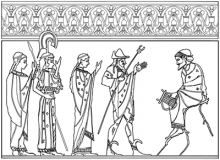
You are here
Episode 2: Choices
Story summary
Teaching activities
- Starting points
- Follow-up
- Further activities
Prepare to listen in the same way as for Episode 1. Preparation for listening is important and can become part of the ‘ritual’ of each session. The second storyteller (Hugh Lupton) is heard in this episode, and you may or may not choose to point this out beforehand.
Recap Episode 1 by asking the following questions:
- Who are Achilles’ parents? (Peleus and Thetis.)
- How has Achilles been protected by Thetis? (He has been dipped in the River Styx, and later disguised and concealed as a young woman.)
- What are the prophecies that hang over him? (He will be greater than his father; he will die young.)
- Who is his best friend and what has Achilles given him? (Patroclus; the ring that was given to his parents on their wedding day.)
- How does this episode begin? How does it differ from the beginning of Episode 1? (Different music, a different voice.)
- This episode is called “Choices”. Can you think of a choice arising from Episode 1 that must be made soon? (Who should be given the golden apple?)
- What did our first storyteller ask us to do? (Imagine.) What does the new one ask you to do? (Imagine.)
- Go through the questions asked at the start. Discuss in detail the choices made. (The decision to kill Paris; the decision to preserve his life; Zeus’ decision to choose Paris; Paris’ decision to choose a beautiful wife; his important decision to grant Aphrodite the apple; Helen’s choice of Menelaus.)
- Ask learners to do as Hugh suggests, and imagine the city of Troy. Spend time and try to create mental or actual pictures of the gates, palaces, carvings, paintings and building materials. What kind of work might people have done there? What about transport, clothes, trade etc? Use reference material to build a detailed picture. This assists the class to build shared historical knowledge of Troy. It also makes the end of the story even more compelling as it fosters a sense of ownership and identification.
- Could Paris have refused to decide between the goddesses? Discuss his decision. Can we blame Paris for his choice? Hugh asks what we would have done — discuss this. Compare answers, particularly male vs female perspectives.
- Can the class work out who is who in the picture,
![[pdf] [pdf]](/sites/default/files/pdf_icon.png) The judgement of Paris? (From the left: Hera or Aphrodite, Athene, Hera or Aphrodite, Hermes, Paris. Of the goddesses only Athene can be recognised — by her aegis (breastplate) in particular. Hermes has a traveller’s hat and staff and winged sandals, while Paris holds a lyre, linking him with Apollo, founder of Troy.)
The judgement of Paris? (From the left: Hera or Aphrodite, Athene, Hera or Aphrodite, Hermes, Paris. Of the goddesses only Athene can be recognised — by her aegis (breastplate) in particular. Hermes has a traveller’s hat and staff and winged sandals, while Paris holds a lyre, linking him with Apollo, founder of Troy.) - Whom does Helen choose? (Menelaus.) Describe him. (Red-haired, king of Sparta.) Elicit other responses. Is he brave? Tall? A warrior? Wise? Handsome? Wealthy? Helen probably had many offers of marriage so Menelaus must have been special. If she had chosen another suitor how would that change the story? Encourage discussion of what would NOT have happened as well as what would.
- It was said that Helen’s beauty was a curse and a blessing. How can it be both?
Think about the choices made in this episode. How many did the gods influence and how many were made by the mortals themselves?
Think about Helen’s choice of Menelaus. Would she have had the freedom to choose her own husband? Link this with the discussion about marriage after Episode 1.
Visual aids
The judgement of Paris
Based on a vase from Vulci, c. 520 BC. British Museum, London.
On the right we can see Paris, ready to choose the winner of the golden apple. He is holding a lyre (linking him perhaps to Apollo, god of music as well as archery, and the protector of Troy). On his left stands Hermes, the messenger of the gods, who can be recognised by his staff, traveller’s hat and winged sandals. Hermes looks as though he is introducing to Paris the three goddesses on his left. Of the goddesses only Athene can be identified, by her snake-trimmed aegis (breastplate) and helmet; the other two are Hera and Athene.
